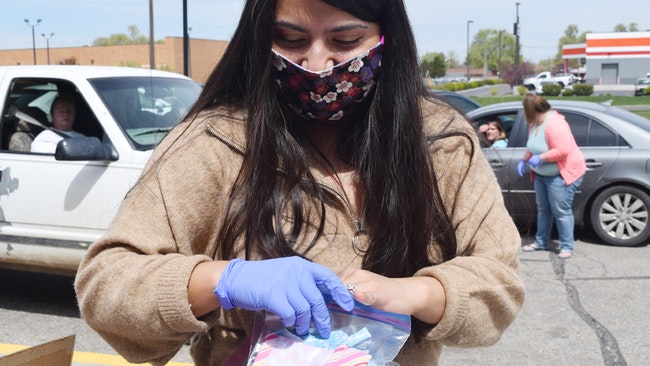 Tanya Navarrete, marketing and development director at Four Rivers Cultural Center, hands out make and care kits at the center Saturday, April 18. The center, in collaboration with Matsy’s restaurant, Ontario Community church and the volunteer group Mask Ontario Save Our City distributed about 500 masks and care kits over a period of two Saturdays. (The Enterprise/Yadira Lopez)
Tanya Navarrete, marketing and development director at Four Rivers Cultural Center, hands out make and care kits at the center Saturday, April 18. The center, in collaboration with Matsy’s restaurant, Ontario Community church and the volunteer group Mask Ontario Save Our City distributed about 500 masks and care kits over a period of two Saturdays. (The Enterprise/Yadira Lopez)
NOTE: The Enterprise is providing free access to its content related to the coronavirus as a community service. Subscriptions at $5 a month help the Enterprise keep this up.
Now, Malheur County waits.
Waits to sit down at a restaurant for dinner.
Waits to get to the barber for a haircut.
Waits to sit in a pew for a church service.
Just a month ago, the state’s most severe restrictions clamped into place, pinching down the Malheur County economy, leaving hundreds suddenly unemployed, and making people stay home as much as possible.
In 2020, it is the year of COVID-19, the respiratory disease so highly infectious and hard to detect that health and government officials have made “social distancing” and “flatten the curve” part of daily language.
In Malheur County, the virus hasn’t yet struck as hard as across the border in Idaho or in other corners of Oregon. As of Monday, health officials reported five residents infected with the virus – four women and one man.
As a result, frustration is mounting over the restrictions. Across Oregon, protestors are demanding that the state back down, that business be allowed to run full throttle, and that people be allowed to move around freely.
Gov. Kate Brown agrees the state needs to return to normal – but has set no timeline for when that would be.
Meantime, across Malheur County, people, institutions and businesses have adapted to a way of life where the measure of six feet is the new social yardstick.
A cascade of orders
The pace of the change was quick.
Oregon’s first confirmed infection of the coronavirus was announced on Friday, Feb. 28. Malheur County wouldn’t officially report its first case until more than a month later, announcing on March 30 that a man in his 20s was infected but recovering at home.
Over that month, limits on life mounted week by week, sometimes day by day.
 Chelsea Skeen, owner of Sugar Momma, an Ontario bakery, prepares boxes of cookies for shipping. (The Enterprise/Yadira Lopez)
Chelsea Skeen, owner of Sugar Momma, an Ontario bakery, prepares boxes of cookies for shipping. (The Enterprise/Yadira Lopez)
Among the most immediate local impacts came from a March 10 restriction on visitors to nursing homes, requiring Pioneer Place in Vale to allow no more than two “essential” visitors for each resident at any one time.
School officials who had been following guidance that class was okay learned of new instructions on March 12 that limited school gatherings and events. Sports events stopped in their tracks.
More importantly, the governor announced on that Monday night that all schools would close for a few extra days, creating a two-week spring break but with classes expected to resume.
Restrictions take hold
Over the next two weeks, increasingly tighter restrictions emerged. On March 16, the governor prohibited gatherings of more than 25 people, ending church services, concerts and other public events. Restaurants and bars suddenly couldn’t serve meals, at least to seated guests. In Malheur County and across Oregon, some restaurants closed, others continued with their usual takeout menus and others created takeout and delivery service to survive.
A week later, as Oregon’s count of those infected mounted, the now-famous “stay home” order came. The governor on March 23 banned any gatherings where people couldn’t stay six feet apart. She told Oregonians to stay home “whenever possible” and ordered parks, playgrounds and skate parks closed.
The order drew criticism as too much and too hasty. Some in Malheur County doubted the seriousness of the pandemic.
“The virus is just a hoax to keep us occupied while something else is being done,” according to a Facebook post by Jeff Mendiola, a heavy equipment operator from Vale.
Clare McKay, a film maker from Juntura, advised in a Facebook post, “Get out and be exposed and strengthen your immune system. But don’t tell me to stay home because you lack basic common sense and understanding of a virus.”
The governor said most businesses could continue operating – but only if they enforced standards to keep customers and employees as protected as possible from exposure to the virus. Marijuana dispensaries in Ontario would subsequently face a threat of closure by city officials because of concerns they weren’t enforcing social distancing standards.
The governor did shut businesses such as barbers, hairdressers, gyms and theaters, concerned that close contact was a path to spreading the virus. Suddenly there was no place to go for a haircut or styling in Ontario or Vale or Nyssa.
And confusion quickly emerged over the governor’s decision that violating any of the restrictions could be treated as a crime. The Malheur County Sheriff’s Office and police agencies in Ontario and Nyssa had to bat down fast-spreading rumors that officers were sealing the Oregon-Idaho border and that they were stopping drivers, asking for documentation they were on their way to a job. The agencies also said they didn’t otherwise plan to haul violators to jail.
But travel and tourism clearly suffered. Hotels reported single-digit occupancy rates. People could no longer camp in state and federal campgrounds. And Idaho residents were banned from coming to Oregon to fish, though rigs with Idaho plates still showed up on the banks of the Owyhee River.
 A sign outside the Ontario Police Department reminds locals of the common guidelines for staying healthy during the pandemic. (The Enterprise/Yadira Lopez)
A sign outside the Ontario Police Department reminds locals of the common guidelines for staying healthy during the pandemic. (The Enterprise/Yadira Lopez)
Schools close, classes go to remote learning
And then came the order that educators dreaded but anticipated. On April 8, the governor said schools couldn’t re-open this year and that teaching would go on long distance. Superintendents of Malheur County schools with 5,200 students scrambled to rebuild curriculum and school operations. One group of students, however, were done: high school seniors. One by one, those with enough credits got calls from their school to say that they were now a graduate, a deflating finish for the Class of 2020.
Parents, teachers and school administrators adjusted to new ways of teaching, though there would be much less class time. Schools figured out ways to produce packets of school work at home. Teachers became broadcasters, conducting class online via streaming platforms such as Zoom.
The COVID-19 pandemic was the second blow for Ontario High School’s yearbook committee, which just weeks earlier lost its teacher.
“We were going with the flow just trying to make sure the yearbook got done,” said Allison Stabler, a senior editor on the yearbook staff.
The class of about 20 students was already working online when schools closed and brainstorming ways to fill in the holes that had been reserved to chronicle now-canceled spring activities such as sports and prom.
Stabler said the staff is thinking of including news articles about the pandemic or sharing posts and thoughts from people in the community. Another idea is to interview senior athletes who didn’t get to play this spring.
“We’re thinking of dedicating some of the yearbook to everything that’s going on and what we’re losing,” Stabler said.
Businesses suffer, workers lose jobs
Day by day, Malheur County’s economy worsened. Layoffs mounted by the week as businesses continued scaling back or closed entirely, unable to survive a steep drop in customers. By mid-April, more than 300 Malheur County residents were seeking unemployment benefits, fattened with an additional $600 a week provided by an emergency act of Congress.
Businesses looked for relief, too. Congress set aside $359 billion to give employers money that would start as a loan but would be turned into a grant if they kept people working. The system to get at the money was built in a rush and it showed. Banks and other lenders couldn’t get program details. Businesses couldn’t find lenders willing to take their applications. And in a matter of days, the money was gone and employers across Malheur County found they were too late.
“A lot of those businesses who failed to receive that funding, they are really going to hurt,” said Greg Smith, Malheur County economic development director.
 South Oregon Street was virtually empty last week, a tell-tale sign of the impact of statewide measures to cut down on the number of COVID-19 virus cases. While some businesses remain partially opened, many were closed. (The Enterprise/Pat Caldwell)
South Oregon Street was virtually empty last week, a tell-tale sign of the impact of statewide measures to cut down on the number of COVID-19 virus cases. While some businesses remain partially opened, many were closed. (The Enterprise/Pat Caldwell)
“I am trying hard to step back and come up with a game plan that could provide hope for folks,” said Andrea Testi, director of the Small Business Development Center at Treasure Valley Community College.
Businesses adapting
Yet small business owners adapted and persisted in the face of the pandemic.
Chelsea Skeen opened Sugar Momma in Ontario in December, exclusively making cookies.
“It’s difficult being a brand-new business and already in the learning process, and then you throw this in there,” she said as she readied dozens of boxes for shipping last week.
She said people are buying because “sugar gets you through.”
Business has been up and down, with a big increase a few days before Easter.
Many customers are having the bakery’s cookies shipped as care packages. Skeen and her employee Madison Waddell decorate some boxes with handwritten notes requested by customers.
“Hope these cookies find you safe and happy!” read the note on a box headed last week to Arizona.
Skeen is also experimenting with contactless transactions. Customers can now call the shop to place their order and pay on the phone. Orders then can be picked up from a table outside the shop.
Hardware stores have remained busy, often a place to hunt for products gone from larger chains and grocers.
As a result, Liz Haun, owner of Nyssa Mercantile, said her suppliers have limited how much she can order of certain products.
“We’ve had problems getting toilet paper, hand sanitizer, bleach, any Lysol or Clorox products, wipes, aerosol sprays,” she said. Haun said her store hasn’t “had any masks come in for two weeks.”
Still, people are tending to seasonal chores.
“It is spring time and everybody is turning on their sprinklers and they have to repair them,” said Haun.
In Ontario, Kinney Bros & Keele True Value Hardware has innovated to meet customer demand for specific products, said co-owner Mara Kirby Garcia.
“A lot of our warehouses ran out of different things and we had to source different vendors,” she said.
Garcia said, for example, one customer needed weed killer but the store didn’t carry the brand the customer wanted.
“But we carried their plumbing products so I was able to contact the vendor and get it,” she said.
Garcia said when the store was out of Lysol and other disinfectant, she sought help from a paint vendor to fill an order. Another time, she found hand sanitizer through the company that supplies ChapStick.
Still toilet paper remains in short supply.
“But we have paper towels, bleach and all-purpose cleaner, disinfectant and homemade masks at the front counter and lots of gloves,” said Garcia.
In Vale, Rick Dentinger, co-owner of Dentinger Feed & Seed, said people are “definitely more aware” of the COVID-19 virus. The hardware and feed supplier is doing fine – for now.
“What worries us is 30 days down the road,” he said. “If you shut everything down, what are we going to do? That’s the scary part.
“Another 30 days down the road, if you shut everything down and people don’t have money, they’re not going to spend it.”
 Grocery Outlet in Ontario is asking customers to forgo reusable bags for now to help curtail the spread of the COVID-19 pandemic. (The Enterprise/Yadira Lopez)
Grocery Outlet in Ontario is asking customers to forgo reusable bags for now to help curtail the spread of the COVID-19 pandemic. (The Enterprise/Yadira Lopez)
Grocers see demand, face stocking challenges
Grocers have kept busy as more households cook meals instead of dining out.
Dale and Jill Gonzalez of Grocery Outlet in Ontario said their store is well stocked, but getting paper products remains a challenge.
“We are posting updates on availability to our store Facebook page or customers may call ahead to ask about specific items in-stock,” they said in an email.
They are asking customers to leave their reusable bags at home to avoid the possibility of spreading an infection. Customers are getting free paper bags for now – and markers on the floor direct them to stand apart while waiting in line at the register.
Employees have increased the frequency of sanitizing throughout the store, with special attention to all high-contact surfaces.
“All employees are wearing masks and are trained to follow proper hand washing and hygiene practices,” the email said.
Michael Chase, owner of Oregon Natural Market, said his health food store in Ontario sold out of its immune support supplements about three or four times after the virus became news in the U.S.
“Special orders increased tenfold over the last four weeks,” Chase said.
There is still a high demand for products such as vitamin C and zinc, which Chase said have been difficult to stock.
The shop doesn’t sell paper products but it does carry soap, sanitizer and wipes. Chase said being a small grocer in the natural food business has made it easier to get those stocks.
“The companies we work with only sell to natural products stores,” Chase said. “Maybe that’s why we were able to access them better.”
He’s changed operations at his store. Bulk bins are no longer self-serve and the store provides curbside pickup. Sneeze guards now stand between cashiers and customers, and staff have doubled down on cleaning and sanitizing the store.
Chase hasn’t had to lay off any employees because business got a bit of a boost.
“If there was a silver lining, it’s been the opportunity to connect with customers who had never shopped in our store before,” he said.
Government goes on, relying on internet
Government agencies, too, have had to adapt. Many closed offices to the public. More services are provided by email or phone. Required public meetings are done virtually, still allowing citizens to keep an eye on elected councils and school boards.
But there have been challenges, according to Jay Chamberlin, manager of the Owyhee Irrigation District in Nyssa.
“We are running about 34 staff and it took a little maneuvering to get them spread out so we are not meeting together,” said Chamberlin.
 A white demarcation line at Phones Plus Phone Repair is new and designed to keep a safe distance between customers and store employees. (The Enterprise/Yadira Lopez)
A white demarcation line at Phones Plus Phone Repair is new and designed to keep a safe distance between customers and store employees. (The Enterprise/Yadira Lopez)
The district decided to turn water into irrigation canals about two weeks early.
“I chose to get started a little earlier because my fear was based on what was going to happen if we had one guy test positive then I could potentially lose my whole crew,” he said.
Ontario City Manager Adam Brown said city services have continued without much change.
Though some employees are working from home, Brown said it is “business as usual.”
“It is a little quieter in the office but everyone is still working and pushing things forward,” he said.
Brown said there are “a lot of conference calls. There is a lot more coordination with the health department, the county and we’ve been trying to push out public service announcements each week.”
At the Malheur County Courthouse in Vale, most county departments are open only by appointment.
Eric Evans, Malheur County planning director, said his office is still busy.
“Nothing has stopped. We haven’t reduced hours. We are processing applications as soon as we can,” he said.
Evans said his department relies more on internet platforms for essential meetings.
“Early on I purchased a GoToMeeting and we use that for all of our land use stuff and our planning commission meeting next week will use that platform,” said Evans.
A voice for caution
The Malheur County Health Department, the prime local source for information on the pandemic, has steadily pushed out information about infections in the county.
Sarah Poe, the agency director, has repeatedly stressed the need for people to comply with social distancing standards to keep Malheur County from becoming a COVID-19 hotspot.
At the same time, the agency has tried to be a calming influence. Its website particularly features advice on how to handle the uncertainty of the times.
“Fear and anxiety can be overwhelming and cause strong emotions in adults and children. Coping with stress will make you, the people you care about, and our community stronger,” said the agency said in a website post. The agency offered advice on how people can manage their stress.
Lt. Mark Duncan of the Oregon State Police said he has noticed out on patrol and when talking with local residents that there is an understanding that the shutdown is important but “cabin fever” is taking hold.
“We are hoping people can weather this a couple more weeks,” said Duncan.
Malheur County Undersheriff Travis Johnson said residents are “antsy.”
“I think generally people are cautious but they are ready to start getting back into the swing of regular life,” said Johnson.
At the Ontario Community Church, pastor Tom Greco said the “stay home” condition has been a benefit in one way, increasing the use of technology for communication.
On Thursday morning last week, he had a virtual breakfast with a men’s group from his church.
“We didn’t eat anything,” he said. “But we talked.”
Greco said that conversation made him feel like they were all sitting together as usual at the Plaza Inn restaurant. Some of his older parishioners who had little prior experience with technology seem to be adapting.
“They realize that if they’re going to be engaged and learn, they’re going to have to figure this out,” he said.
While many of his parishioners have shared feeling isolated and somewhat restricted, he said people are pragmatic and understanding of circumstances.
“I’m not hearing a lot of woe is me,” Greco said. “In fact, many of them are saying how can we serve.”
Pat Caldwell [email protected].
Yadira Lopez, [email protected].
HELP THE COMMUNITY GET THE FACTS….
As long as we can, the Malheur Enterprise will provide free access to all stories related to COVID-19. With businesses closed and not advertising, community support for this service is vital. Help one of two ways:
SUBSCRIBE – $5 a month, automatically.
DONATE – to our LOCAL NEWS FUND. Tax deductible, and anonymous if you wish.
Thank you!




